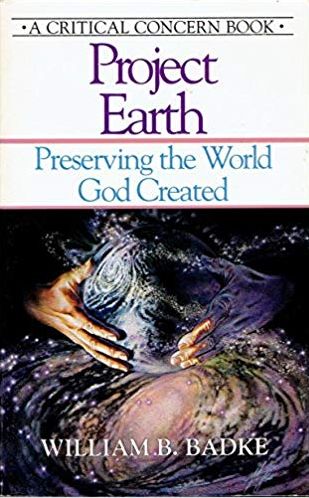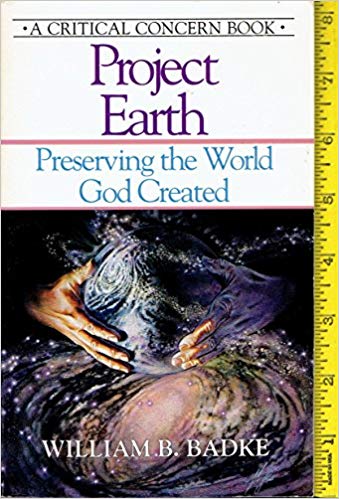Project Earth: Preserving the World God Created
Project Earth: Preserving the World God Created
Couldn't load pickup availability
Project Earth: Preserving the World God Created
by William B. Badke (Author) Paperback – January 1, 1991
"Project Earth offers a direct challenge to the conspicuous silence of evangelical Christianity toward the globe's looming environmental problems. This book contests conventional evangelical thinking and practice by linking today's environmental crisis to fundamental tenets of the Christian faith. The challenge might be interpreted as another swipe from theological liberalism except that the author himself carries evangelical credentials. William Badke is associate professor of Bible and theology at Northwest Baptist Theological College and Seminary in Langley, British Columbia, Canada. Project Earth offers a direct challenge to the conspicuous silence of evangelical Christianity toward the globe's looming environmental problems. This book contests conventional evangelical thinking and practice by linking today's environmental crisis to fundamental tenets of the Christian faith. The challenge might be interpreted as another swipe from theological liberalism except that the author himself carries evangelical credentials. William Badke is associate professor of Bible and theology at Northwest Baptist Theological College and Seminary in Langley, British Columbia, Canada.
The author chides evangelicals for narrowly focusing the central truths of Scripture, and their proclamation, to only the spiritual dimension (i.e., humanity's sinfulness and redemption) with insufficient regard for Scriptural teachings regarding the divine mandate to care for the earth. Evangelicals indifferent to the Earth's plight are guilty, not of the sin of commission (as historian Lynn White suggests), but of omission. With this opening critique, supplemented with a brief non-technical survey of current environmental problems (toxic waste, acid rain, ozone depletion, global warming, loss of rain forests and agricultural land), the book proceeds to its main task of convincing evangelical Christians that caring for the earth is a biblically mandated responsibility.
The book's premise is that creation bears witness to God. Aspects of this premise are used to structure five of the nine chapters. Two chapters succinctly review four ways in which creation's witness is evident: l) nature's testimony to the Creator's glory, 2) God's nuture or providence for all life, 3) penalty (death for all creatures), and 4) precariousness (life's insecurity after the fall). These revelatory and dark witnesses of creation are seemingly in tension, but they are all part of God's plan to call human beings back to himself, the former as blessings accompanying faithfulness and the latter as judgement for not responding to his call. Environmental problems are viewed as a reflection of human rebellion against God.
The next two chapters elaborate on this theme by confronting evangelical arguments which point to God's curse on creation and the apocalyptic vision of a destroyed earth as reasons for not participating in the restoration of an environmentally hurting world. An intervening chapter then poses three options for consideration: indifference, damaging exploitation, and active support. The latter is obviously the author's option of choice and this leads to a culminating chapter describing the fifth witness: reclamation. The creation bears this witness when Christians, renewed in the image of God, actively proclaim and participate in the earth's healing. In the next chapter, an attempt is made to offer pragmatic suggestions which manifest the witness of reclamation. Most are of the Abe informed and get involved" variety, except for the author's suggestion for believers to re-examine their consumptive lifestyles, which is probably the most effective but also the most sacrificial.
The book concludes with 15 Propositions for a Christian Ecology which essentially summarize its theological argument. An appendix lists 39 environmental tips for households and 11 for churches, all familiar to the ardent environmentalist.
This is a short, readable book oriented mainly to evangelical leaders and laypersons unfamiliar with biblical perspectives on the environment. Those familiar with theological discourse on creation will find it rudimentary, although occasional criticism of contemporary Christian writers (e.g., Wesley Granberg-Michaelson) provides alternative viewpoints. Personal anecdotes at chapter introductions illustrate major points but they sometimes fall short in their analogy. Chapter footnotes refer to a mix of academic and popular references.
Project Earth recognizes that the environmental crisis is ultimately reflective of a spiritual problem. It challenges evangelical Christians to search the Scriptures, repent, renew their hearts and minds, and act as the Creator's envoys in reclaiming all creation. It is a welcome addition from the evangelical camp to the meager array of Christian writings on the environment. Project Earth recognizes that the environmental crisis is ultimately reflective of a spiritual problem. It challenges evangelical Christians to search the Scriptures, repent, renew their hearts and minds, and act as the Creator's envoys in reclaiming all creation. It is a welcome addition from the evangelical camp to the meager array of Christian writings on the environment."
Reviewed by Harry Spaling, Land Evaluation Group and Department of Geography, University of Guelph, Guelph, Ontario, Canada N1G 2W1.
Share
People also searched for
View full details



